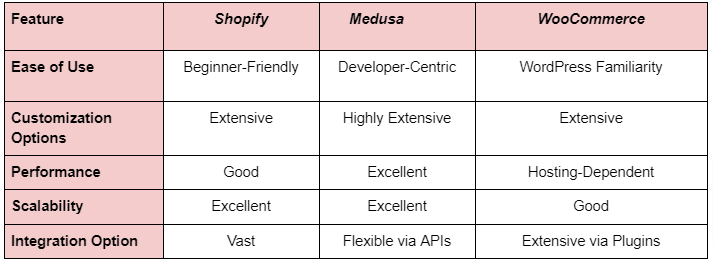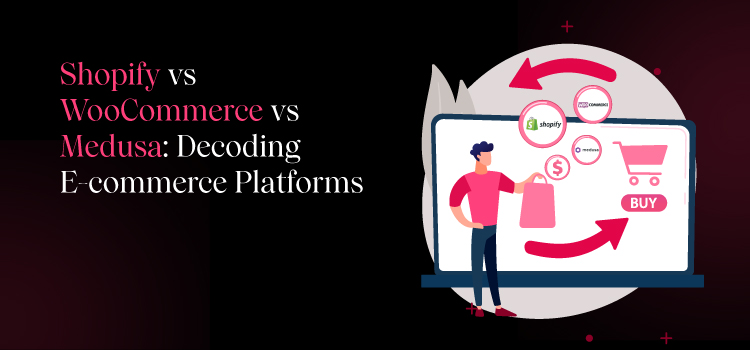Choosing the right ecommerce platform can feel as challenging as facing a mythical beast. There are several key players when it comes to ecommerce integrating platforms, top notable contenders are shopify, woocommerce, wix, magento, zoho, medusa etc. In this blog, let’s discuss shopify, wocommerce & medusa, also their benefits, comparison and their features. Each comes with its own set of benefits and features, making the choice a complex one. In this comprehensive comparison, we’ll dissect these platforms, explore their offerings, and help you make an informed decision for your e-commerce venture.
What is Shopify?
Shopify, founded in 2006, is the reigning champion of e-commerce platforms. Boasting around 2.1 million daily active users, Shopify simplifies online selling. Its user-friendly interface, extensive feature set, and dynamic community make it a top choice for businesses of all sizes.
Shopify offers a vast library of customizable themes, enabling you to align your online store with your brand’s identity. Additionally, it provides integrated tools for selling, order management, and inventory control.
The platform’s ace in the hole is its app store, brimming with plugins that empower you to enhance your store’s functionality. Shopify also offers a Point of Sale (POS) solution, bridging the gap between online and brick-and-mortar sales.
Shopify Benefits:
- User-friendly interface.
- Extensive app store for enhanced functionality.
- Robust customer support.
- Secure hosting and automatic updates.
- Scalability for handling high traffic
What is WooCommerce?
WooCommerce is not a standalone platform but a WordPress plugin, making it an ideal choice for WordPress enthusiasts. This open-source plugin transforms your WordPress site into a fully functional online store. With WooCommerce, you have complete control over design and functionality.
WooCommerce leverages the extensive WordPress community, offering a wide range of plugins and themes. Its open-source nature ensures endless possibilities for customization, making it a popular choice for those already immersed in the WordPress ecosystem.
WooCommerce Benefits:
- Open-source and free.
- Seamless integration with WordPress.
- Total control over design and functionality.
- Thriving community support.
- Abundance of plugins and themes.
What is Medusa?
Medusa, a newcomer in the e-commerce landscape, emerged in 2021 with substantial backing. Despite its youth, it has quickly grown a community of over 4,000 members and 20,000 projects, indicating promising potential.
Medusa sets itself apart with its headless commerce architecture. This approach decouples the front-end and back-end of your online store, providing unparalleled flexibility. Unlike Shopify’s SaaS model, Medusa is open-source and free to use. However, it does require JavaScript proficiency to harness its full potential.
Medusa Benefits:
- Headless commerce architecture for unparalleled flexibility.
- Extensive customization options.
- Enhanced performance with faster page loading.
- API-first approach for seamless integrations.
Comparison in Features of Shopify, Medusa and Woocommerce


In-Depth Pros and Cons Comparison
1. Shopify
Pros:
- All-in-One Solution: Shopify provides everything you need for e-commerce, from hosting to domain purchasing, site building, inventory management, marketing tools, and more. You won’t need to piece together different services, simplifying your operations.
- Exceptional Customer Support: Shopify offers an extensive support system, including community forums, a comprehensive help center, and direct customer support. You’ll find solutions to your queries and connect with a vibrant user community.
- Versatile Product Selling: Whether you sell physical, digital, bundled, or subscription products, Shopify accommodates your needs. Its flexibility allows you to expand into various industries with ease.
- Built-in Security: Shopify includes essential security features like SSL certificates, two-factor authentication, secure hosting, and compliance with industry standards. You can focus on your business without worrying about security.
Cons:
- Recurring Payments: Shopify operates on a subscription model, meaning you’ll have ongoing monthly fees. While these fees are justified for most businesses, some may prefer one-time software purchases.
- Transaction Fees for Non-Shopify Payments: If you use payment gateways other than Shopify Payments, you’ll incur additional transaction fees. This may discourage users from exploring alternative payment processors.
- Limited Free Themes and Expensive Paid Themes: Shopify offers fewer free themes compared to the past, with most themes now requiring a purchase. Premium themes can be relatively costly, but they offer excellent design and features.
- Limited Blogging Interface: Shopify’s blogging interface is less robust compared to dedicated blogging platforms like WordPress, which might not fully meet the needs of content-focused businesses.
2. Woocommerce
Pros:
- Seamless WordPress Integration: WooCommerce seamlessly integrates with WordPress, the world’s most popular content management system. This synergy allows for extensive content creation and customization, making it an excellent choice for content-driven businesses.
- Extensive Plugin Ecosystem: WooCommerce boasts a vast library of plugins, extending its functionality in numerous ways. Whether you need advanced payment gateways, shipping options, or marketing tools, you can find a plugin to suit your specific requirements.
- Total Control and Customization: WooCommerce provides unparalleled control over your online store’s design and functionality. You can tailor your site’s appearance, features, and user experience to align perfectly with your brand and customer preferences.
- Scalability and Flexibility: WooCommerce is highly scalable, accommodating businesses of all sizes. Whether you’re a small startup or an established enterprise, you can start with WooCommerce and grow your online presence with ease.
Cons:
- Self-Hosting Complexity: As a self-hosted solution, WooCommerce necessitates managing your hosting, security, and performance optimization. While this provides more control, it also requires technical expertise or additional resources.
- Plugin Management: While the extensive plugin library is a strength, it can also be a challenge. Managing multiple plugins can lead to compatibility issues, potential conflicts, and increased maintenance efforts.
- Learning Curve: WooCommerce’s robust customization capabilities may pose a learning curve for beginners. Building and managing a WooCommerce store effectively may require a steeper initial learning curve compared to some hosted platforms.
- Costs Can Accumulate: While WooCommerce itself is free, costs can accumulate as you invest in premium themes, plugins, hosting, and other necessary elements. Budget planning is essential to ensure cost-effectiveness.
3. Medusa
Pros:
- Exceptional Speed: Medusa’s headless architecture ensures lightning-fast performance by separating the front end from the back end.
- High Customization: Customize your website’s design with your preferred front-end solution while seamlessly integrating e-commerce functionality through Medusa’s commerce API.
- Developer-Friendly: Ideal for JavaScript developers, Medusa offers flexibility and ease of development with its REST API and active developer community.
- Quick Setup: Deploying Medusa is straightforward, requiring only a few commands for a fully functional online store.
Cons:
- Basic Features: Out-of-the-box features are relatively basic, requiring additional development for advanced functionalities.
- Simplistic Storefronts: Medusa’s default ‘themes’ may lack the visual appeal of other platforms, demanding more design expertise.
- Limited Plugins: Medusa currently offers a limited selection of plugins compared to established platforms.
- Developer Dependency: To fully leverage Medusa’s potential, proficiency in JavaScript is essential, making it less suitable for non-developers.
Also Read: Essential Factors to Consider for Successful Ecommerce Website Development
Conclusion
In the Shopify vs. WooCommerce vs.Medusa showdown, here’s what you need to know:
- Shopify is the heavyweight champ with an easy-to-use setup and tons of features. It’s a solid choice for most businesses, but it does come with monthly fees and extra costs for certain payment methods.
- WooCommerce is like a sidekick, working best for WordPress fans. It gives you full control and lots of options, but it can be a bit tricky for newcomers and might cost more as you add extras.
- Medusa stands out with its super-speedy setup and flexibility for tech-savvy folks. It’s great for developers but might not be the best for beginners or those who want lots of pre-built features.
The best pick depends on your skills, business needs, and budget, there’s no one-size-fits-all solution. Make your selection wisely, and your e-commerce journey will be smooth, avoiding any mythical complexities along the way.


